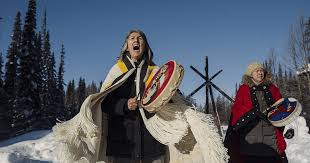Yintah 2024 Movie Review
The Wetʼsuwetʼen clan, which exist in what the West refers to as Canada, fight to preserve their drinking water source and their salmon bearing river Widzin Kwah as it’s being targeted as an oil pipeline destination. Yintah, which means “land” in their native language, chronicles their 2019-2020 resistance against colonization as they aim to protect their land for future generations.
“Good trouble” is a phrase coined by the late Civil Rights leader and Representative John Lewis that spoke to civil disobedience and standing your ground against immoral advancements. It’s the phrase that sprung to mind while watching Yintah, which chronicles the indigenous Wet’suwet’en people who are fighting against the Canadian government to maintain control over their land. The territory, which the clan maintains is still under their ownership, has been identified as an area for a new pipeline by oil company Coastal GasLink.
The documentary by Jennifer Wickham, Brenda Michell, and Michael Toledano is a startling and infuriating depiction of the Wet’suwet’en people’s fight. Focused on leaders Howilhkat Freda Huson and Sleydo’ Molly Wickham as they lead the resistance, the documentary spans over a year of their organization against Canadian Prime Minister Trudeau’s government and Coastal GasLink’s trespassing on their property. The film also provides needed context about the indigenous community’s past on the land, including the fact that white people stole Wet’suwet’en children a few generations ago.
More than anything, Yintah is a gross reminder that police and government are above the law, and colonizers will take what they deem is theirs with violence and force. The most striking moments in the film are in the face-offs between the two sides: one side armed with guns, pointed at the heads of their adversaries, while the other side constantly screams that they are unarmed. In the last stand before our main fighters are arrested, the police admit they have no warrant but still bust down the door with authority.
The documentary has deep ideas, though not entirely novel ones: colonization is the West’s enduring legacy, but when will enough be enough? What happens when an indigenous people do not agree to be ruled by the nation that claims it? How do you resist opposite machine guns and trained attack dogs?
Unfortunately Yintah doesn’t have the answers to these questions. The end interstitials reveal that the pipeline project was completed, though the Wet’suwet’en people ballooned the budget over $10.5 billion in excess due to their resistance. There are more pipelines planned, many of which would be on their land. But the fight continues, and Canada continues to stifle their existence and their rights. It’s not exactly a hopeful ending, just a realistic one: colonization will always be hungry for more.




